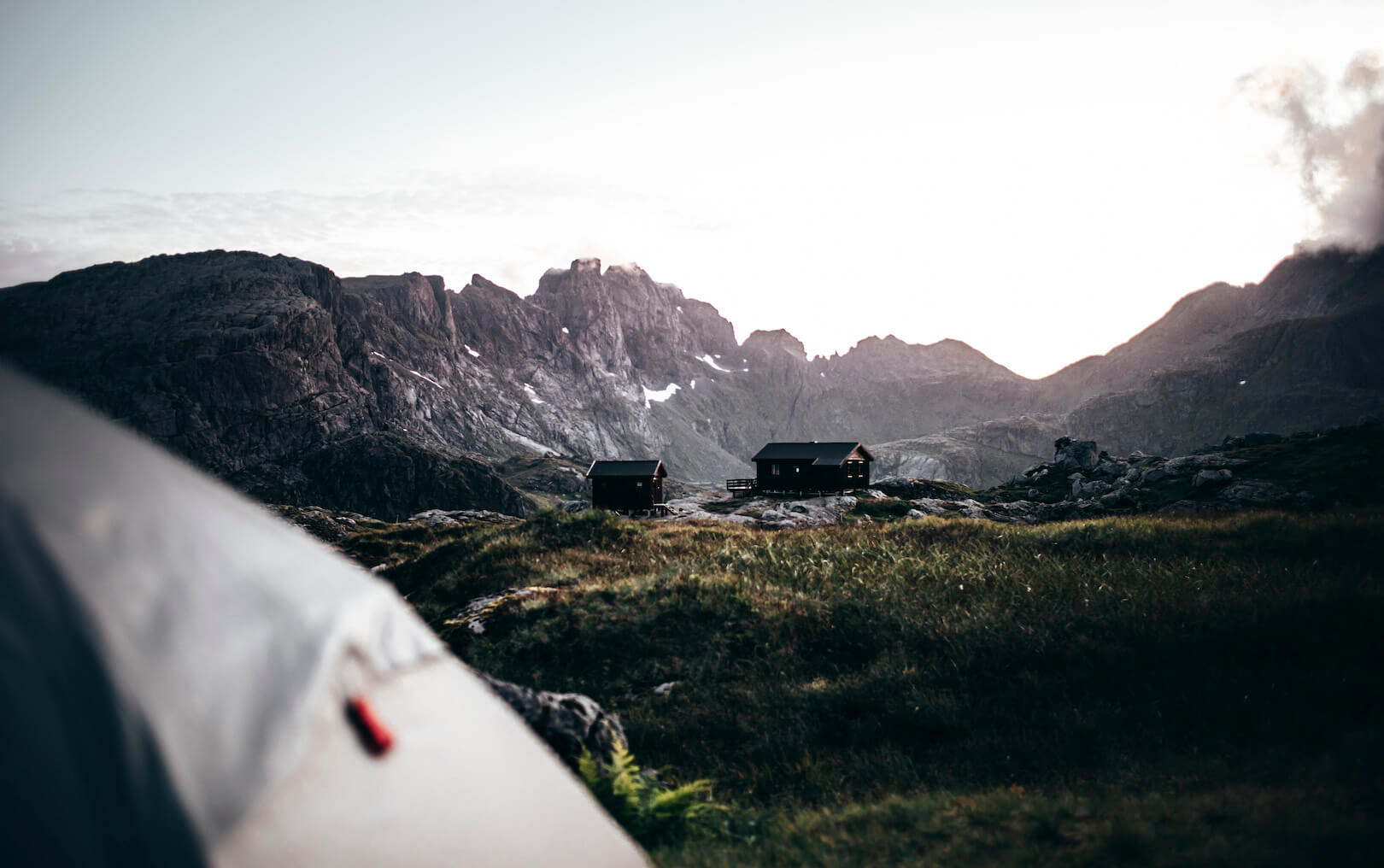
How to Plan your Road Trip to Norway (What be aware of before you go)

15 best things to do in Porto (How and where to find them)
14. January 2020
How to spend a night in Norway on a low budget
23. April 2020Thinking about doing your next road trip to Norway? Do you know how much money you will need to handle all your expenses; like car rental, fuel prices, ferry costs, camping charges or even just eating Norwegian food?
Have you thought about how else can you spend a night in Norway besides sleeping in hotels? There are many ways you can reduce your road trip budget around Norway, but you can’t decrease the price of gas, can you?
Do you have a list of traditional Norwegian food you’d like to try, such as whale steak, fresh cod, seafood or the delicious cinnamon rolls with brown caramel cheese? Even if these things are not common, you should definitely try them out.
Keep reading and you’ll find out how to manage your expenses, eat like a local and make your Norwegian road trip an epic one!
Table of Contents
First things first: How to get to Norway
If you are from Europe, you have two options, you can either go by plane or by land in either a car or van. If you’re not from Europe, the only way to get there is by plane. Let’s look at what is best.
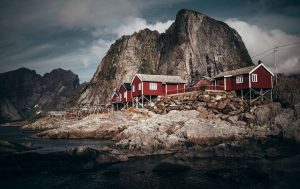
Car fees in surrounding countries
If you’ve decided to go by car or van you’ll be driving from a neighboring country of Norway, therefore you will pay for highways and fuel in those countries.
Here’s the price of fuel and highway tolls as at January 2020.
| Country | Gasoline/diesel fees | Highway fees |
|---|---|---|
| Poland | 1.170€/1.220€ / liter | ~ 0.860€ / 100km |
| Germany | 1.403€/1.310€ / liter | free |
| Denmark | 1.630€/1.460€ / liter | free, just bridges |
| Sweden | 1.520€/1.570€ / liter | free |
| Finland | 1.520€/1.420€ / liter | free |
| UK | 1.490€/1.560€ / liter | more here |
*source www.globalpetrolprices.com
So, is it worth going by car to Norway? Well, that depends, for example, if you’re going through Poland and then through Sweden by ferry, it’s worth it. On the other hand, if you’re going from The Netherlands to Germany and then through Denmark, it will be a lot more expensive. It’s best to compare the price of flight to the cost of going by car, to know what is best for you. Don’t forget, you might have to hire a car when you arrive by plane, these fees are broken down below.
Calculate your fuel costs
Ferries to Norway from central Europe
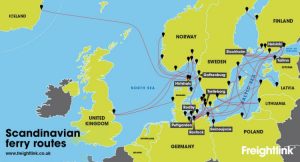
When traveling by car you will need to factor in the cost of ferries, they are basically unavoidable if you want to reach the best places in Norway. There are a variety of companies offering to transport you by ferry, and they aren’t cheap. So, how do you pick the right one?
| Country from – to | Prices € |
|---|---|
| UK – Norway | 1400 |
| Denmark – Norway | 100 – 500 |
| Germany – Norway | 100 – 500 |
| Germany – Sweden | 20 – 200 |
| Poland – Sweden | 100 – 200 |
*Prices are approximate, depending on the number of people, from the type of car and the time of departure.
In my opinion, the best way to get there is by going through Denmark to Sweden. You can take a cheap ferry from Germany (Rostock) to Denmark (Gedsar), then through Denmark to Copenhagen and from there to Malmo via a long bridge (we paid €50).
If you want to save some money on ferry fees you should go as early as possible with the smallest car and at least 4 people. Prices go up depending on the type of car, the number of passengers and the time of departure. Also worth mentioning is where you buy your ferry tickets from. NEVER buy tickets in the physical store, because prices are double compared to what you can find on the internet.
Book and buy the ferry here
Road Trip to Norway by car
Before getting behind the wheel of your car, here’s what you need to know about driving in Norway.
1. Rent a car
If you’ve come to Norway by plane, all you’ll need to do when you arrive is rent the car, sounds easy right?
Payment methods
The opposite is true, the first thing you need to know is that you’ll need a credit card! It is very hard to deal with rental car agencies when you have an only debit card in your pocket. They can’t hold your money on the debit card, furthermore, most agencies won’t allow you to rent a car with a debit card.

Even if you find such an agency that will, it’s quite uncomfortable to pay $1000 just to assure the agency that you’ll come back with their car. Of course, they will return your money if you return their car in one piece, but you won’t have access to that money for the rest of your trip.
Table with all rental car agencies in Norway for their acceptance of credit cards.
| Car rental agency | Debit card | Credit card |
|---|---|---|
| Alamo | not accepted | accepted |
| Thrifty | with deposit $200.00 | accepted |
| SIXT | not accepted | accepted |
| Budget | accepted over 25 years old | accepted |
| AVIS | with $350 plus deposit | accepted |
| Europcar | with $330 deposit | accepted |
| Hertz | not accepted | with $200.00 deposit |
| National | accepted | accepted |
| Enterprise | not accepted | accepted |
Extra fees, car types & drop-off locations
Another problem with renting a car is that agencies charge an extra fee for age, as well as for less experienced drivers. In this case, be prepared to pay a large amount of money if you are less than 25 years old or you have less than ten years experience with driving. For example, 2 and a half years ago when I was 20, I paid €900 just to rent a car for 9 days.
In addition to the car rental, you’ll need to account for fuel. In Norway, you’ll mainly rent hybrid vehicles or occasionally full-electric cars meaning you’ll spend less on fuel. I highly recommend renting a hybrid car.
Lastly, you must choose a pick-up and drop-off location in the same location to save money. That means you must return to the same city you picked it up, so I suggest planning a route that circles back to your drop off location to make sure you see everything you want to. Otherwise, you can pay a little extra to drop the car off in a different location.
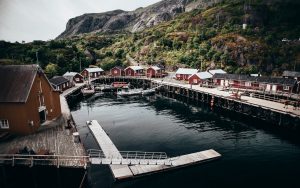
2. Driving a car
Finally, you’ve arrived in Norway in your car or one rented on arrival. You now need to know a couple of important things before you start driving, to avoid problems or unpleasant situations. Don’t worry, from 1967, you can now drive on the right side of the road!
Norway fuel prices
The price of fuel, mainly of gasoline, is very high when compared to the rest of Europe. From $1.72 to $1.87 per litre, not to mention even higher diesel prices. I suggest counting how much it will cost you to drive 3,500km around Norway as I did in August 2019. BUT when you know when to refuel, you can save a lot of money on your road trip around Norway.
Current prices of gasoline/diesel in Norway
Norway petrol stations
Since all pumps in Norway are franchised, there is a relatively specific relationship between the brand owner and the gas station owner. Twice a week (Monday and Thursday), the franchise issues the recommended price of fuel and compensates owners of individual service stations for the loss resulting from the price increase to the recommended price. Therefore, on Monday and Thursday, every week between 11 am and noon, all gas stations throughout Norway are more expensive. From the moment the compensation takes place, there is a free competition that reduces prices. That is why it is cheapest to fill up your car on a Monday early in the morning (or late on Sunday) and at a reasonable price on Thursday morning. This can save you a lot of money on your road trip around Norway because this rule applies throughout the entire country.

Payments methods
Knowing how to refuel is not as self-evident as it might seem. First of all most petrol stations, even those with attendants, have automatic payment cardholders (No banknotes are accepted) in advance. This is done by giving your credit card to the terminal before refueling, the terminal checks with your bank to see if you have enough money for about 100 litres of fuel and if so, it will let you in and deduct the amount for which you refueled. If you don’t have a credit card or if you aren’t able to use it for this reason, go to the rack closest to the entrance and press the “Betal i kassen” button – then you can pay as usual. Just be aware, this is not available everywhere.
Search for petrol stations in Norway
The arrival at the petrol station is also quite unique. Unlike continental Europe, Norwegian petrol stations are not one-way. It is possible to drive (and drive out of) the petrol pumps from either side. This can be a frightening experience for people not used to this.
Road fees & ferries
Because Norway is full of fjords, some roads just end on the coast and continue by crossing with a ferry. Usually, they cost around 119NOK (around €12) but, depends on the distance. For example, a ferry from Bodo to Moskenes cost us 1040NOK (€105). Tickets were bought directly on the ferry and don’t worry about having the right amount of cash, you can pay by debit/credit card. If you rented your car be ready to pay fees for bridges, highways and for the entrance into some towns. Rental car agencies will hold on your credit card €200 in case you incur these fees. If you’re traveling in your own car you won’t need to worry about these charges.
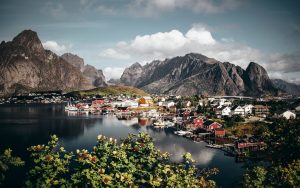
Roads & car crashes
Roads in Norway are very narrow, mainly in the countryside where you should be careful and reduce your speed. 80km/h is the speed limit and there are huge fines for exceeding them. Also, I don’t recommend crashing there. We had a minor crash the experience was less than pleasant. dealing with other people to handle the legal side of things in a foreign country was awful, to say the least, so be extra careful as it can ruin your road trip completely.
Conclusion
Considering all the factors above I would personally choose to start my road trip around Norway by car, but again it depends on where are you from. The cheapest way to get there is through Poland and Germany, from Germany to Sweden by ferry and then a few more km’s to Norway.
You should definitely consider this option if you are younger than 25 years old because extra fees for renting a car can increase your budget a lot. But if you’re over 25 and you can rent an electric car, this will be the cheaper option, as long as you can find cheap flight tickets.
A good argument is also when you’re in your car you’ll have more freedom.
I hope what I’ve written will help you find the right option which suits you best.
How to spend a night on a road trip around Norway
Wondering how else you can spend a night in Norway other than sleeping in hotels?
What You Can Eat on Your Road Trip around Norway
Have you ever tasted traditional Norwegian food? There are local delicacies like whale steak, fresh cod, seafood or the delicious cinnamon rolls with brown caramel cheese? If you’re a foodie, you should definitely read about the traditional foods you should eat while in Norway.
Read more here

